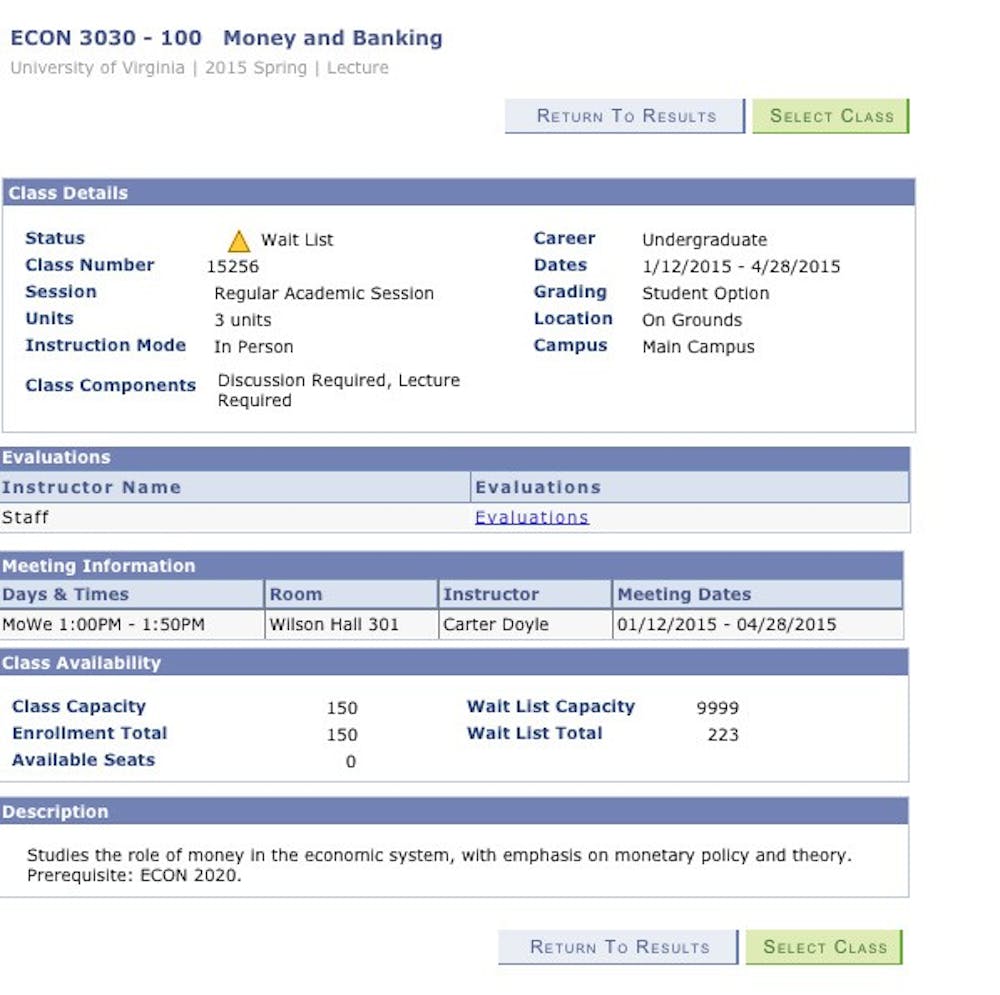Each semester, students in popular majors such as computer science, economics and politics encounter long waitlists as they sign up for courses and struggle to fulfill major requirements.
The computer science department recently saw a spike in popularity, leading it to cap its Bachelor of Arts majors at 85 students after the class of 2015. The B.A. major has seen an increase of about 50 percent yearly in the last few years, according to Kevin Skadron, director of undergraduate studies in the department.
Along with the growth in the B.A., the computer science department has seen a dramatic increase in interest in upper and lower level CS courses, Assoc. Computer Science Prof. Mark Sherriff said.
“To manage the demand and to ensure our majors can get the courses they need to graduate, we have used a ‘gated’ system where we reserve seats for certain groups of students at first before opening the courses to all students,” Sherriff said. “We do our best to get all students for whom a course is required in first, then students who might be interested in becoming majors, and then everyone else.”
Among the department’s most popular electives are "Web and Mobile," "Artificial Intelligence" and "Cloud Computing."
“That is the chief problem we are seeing right now,” Skadron said.“There are some long waitlists for the most popular electives. This should not be as serious once this large, fourth-year class graduates.”
CS majors in the Engineering School take the same classes as CS majors in the College, which also contributes to the overcrowding issue.
“There is certainly some frustration with upper level CS majors for getting the electives that they want,” Sherriff added. “Our electives have higher waitlists than basically any other courses in [the Engineering School]. But we do our best to accommodate as many as possible.”
To address the issue, the CS department will hire four more full-time faculty members, which will allow them to offer more courses.
The Politics Department has more majors than any other department within College. The department has averaged more than 700 students per year in one of the two majors — Government or Foreign Affairs — since 2000.
Associate Politics Prof. John Echeverri-Gent, the department's director for undergraduate studies, said the number of majors has remained relatively stable in the last few years, but this still creates a high demand for courses.
“There have been cases where we have more demand for our courses than we have seats for them,” Echeverri-Gent said.
The department has addressed this issue in part by reforming major requirements, he said. Completion of the major used to require two of the 10 courses be at the 4000-level or above — of which most courses only have 20 seats — but this was reduced to just one, while focus on the capstone project was increased. Echeverri-Gent said the 4000-level courses were a bottleneck for many students.
“We’re also, as a consequence, trying to increase the number of 2000-level courses that we teach, which are designed to be small courses — about 25 [students],” Echeverri-Gent said. “[This] allows students early on in their experience at the University [to] get this experience, [and is] helpful to decide whether they want to be politics majors.”
These changes did not require additional funding or the hiring of new faculty.
The economics major is also one of the largest in the College, with about 600 majors. Though the number of majors each year is variable, it has always been large, and crowded courses are a problem, said Ron Michener, the department's director of undergraduate studies.
“There’s not a whole lot of trouble that more money can’t solve,” he said. “The difficulty now really goes back a number of years, when the University’s financial position was tighter and hiring freezes were more severe."
Part of the solution lies in recruiting more faculty members, both in the regular tenure track and as visiting faculty.
“Last year we were given fairly generous hiring authority, and this year we are recruiting a number of new faculty members,” Michener said. “There’s also kind of a casual market for visitors and it is sometimes possible to create additional course sections for a year or two, and that’s how transitory fluctuations in demand are met. That’s how short-run adjustments can be made.”
Another solution to the problem of overcrowded courses could lie in advising as well, said Echeverri-Gent.
“Students sometimes wait until their last semester to meet all requirements,” Echeverri-Gent said. “One way of dealing with this problem is if students can plan ahead a little better.”







